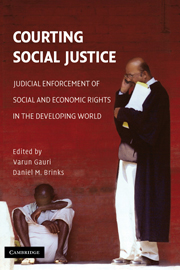Book contents
- Frontmatter
- Contents
- Foreword
- Preface
- Contributors
- 1 Introduction: The Elements of Legalization and the Triangular Shape of Social and Economic Rights
- 2 Litigating for Social Justice in Post-Apartheid South Africa: A Focus on Health and Education
- 3 Accountability for Social and Economic Rights in Brazil
- 4 Courts and Socioeconomic Rights in India
- 5 The Impact of Economic and Social Rights in Nigeria: An Assessment of the Legal Framework for Implementing Education and Health as Human Rights
- 6 The Implementation of the Rights to Health Care and Education in Indonesia
- 7 Transforming Legal Theory in the Light of Practice: The Judicial Application of Social and Economic Rights to Private Orderings
- 8 A New Policy Landscape: Legalizing Social and Economic Rights in the Developing World
- Index
- References
8 - A New Policy Landscape: Legalizing Social and Economic Rights in the Developing World
Published online by Cambridge University Press: 27 July 2009
- Frontmatter
- Contents
- Foreword
- Preface
- Contributors
- 1 Introduction: The Elements of Legalization and the Triangular Shape of Social and Economic Rights
- 2 Litigating for Social Justice in Post-Apartheid South Africa: A Focus on Health and Education
- 3 Accountability for Social and Economic Rights in Brazil
- 4 Courts and Socioeconomic Rights in India
- 5 The Impact of Economic and Social Rights in Nigeria: An Assessment of the Legal Framework for Implementing Education and Health as Human Rights
- 6 The Implementation of the Rights to Health Care and Education in Indonesia
- 7 Transforming Legal Theory in the Light of Practice: The Judicial Application of Social and Economic Rights to Private Orderings
- 8 A New Policy Landscape: Legalizing Social and Economic Rights in the Developing World
- Index
- References
Summary
Summarizing the information presented in the preceding country chapters is a daunting task. Although they touch on similar themes and provide an abundance of comparable information, the country chapters are rich and varied, illustrating the diversity of experiences encountered in each country. Even the most cursory review of the chapters, however, leads to an undeniable conclusion: for good or ill – or, more accurately, for good and ill, as we will see – the language of rights, the mechanism of courts, the intervention of lawyers, and the cumbersome tools of the law have become a permanent and prominent part of the policy-making landscape. Even in countries in which the courts are weak and social and economic (SE) rights litigation is rare, judicial enforcement is already part of the imaginary of social activists, awaiting only the right conditions to make its presence felt.
That legalization involves a coincidence of good and ill suggests the proverbial glass, either half-filled or half-empty. From the perspective of activists and public intellectuals, for whom the social injustices of their societies are all too evident, the achievements of the courts are bound to be disappointing. Several activists in South Africa, for instance, expressed to us in interviews some frustration at the deference to policy makers that the courts there tend to exhibit. In India, the more common lament was a sense that grandiose judicial rhetoric far exceeds actual achievements – sound and fury signifying little.
- Type
- Chapter
- Information
- Courting Social JusticeJudicial Enforcement of Social and Economic Rights in the Developing World, pp. 303 - 352Publisher: Cambridge University PressPrint publication year: 2008
References
- 13
- Cited by



